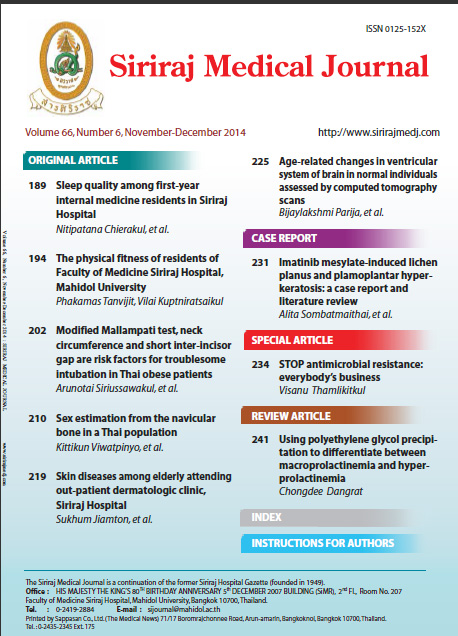Sleep Quality Among First-Year Internal Medicine Residents in Siriraj Hospital
Abstract
Objective: Sleep loss affects function of humans in terms of cognition, learning, and also memory. Suboptimum sleep is inevitable during residency training especially in internal medicine. Regulation of maximum hours of work per week and duty period for in-training physicians has been established in some countries, but not yet inThailand. This study aims to describe the sleep hygiene, perception of reduced sleep hours, and daytime performance of internal medicine residents during the first year of training in one major teaching hospital in Thailand.
Methods: Self-administered questionnaires were distributed to first-year internal medicine residents after informed consent at the time of orientation before training for baseline data, then at 6 and 12 months after training.
Results: Among 56 participants, the mean age was 27 ± 1 years, and 30 of them were female. Average sleep hours was significantly decreased (p < 0.001) from 7.0 hr at baseline (M0) to 6.0 hr at month 6 (M6) and 6.1 hr at month 12 (M12). On the contrary, the Epworth Sleepiness Scale (ESS) was significantly increased after being the trainee (5.7/24 at M0, 8.6 at M6, and 8.0 at M12, p < 0.001). Perception of reduced sleep hours did not change significantly after training (42.9/65 at M0, 43.5 at M6, and 43.0 at M12, p > 0.46). Daytime function in terms of fatigue, irritability, depressed mood, impaired memory, poor concentration, and decreased learning ability were significantly increased at M6 and remained stable at M12, except for the further increment of irritability and impaired memory (p < 0.05). Conflict events with colleagues were significantly increased at M12 and medical errors were significantly increased at M6 and stable at M12 (p < 0.05).
Conclusion: Internal medicine residency training greatly influences the sleep quality of physicians. Tendency towards sleep loss may be one of the stressful environments determining their self-reported impairment of daytime functions.
Keywords: Sleep loss, internal medicine, residency training
Downloads
Published
How to Cite
Issue
Section
License
Authors who publish with this journal agree to the following conditions:
Copyright Transfer
In submitting a manuscript, the authors acknowledge that the work will become the copyrighted property of Siriraj Medical Journal upon publication.
License
Articles are licensed under a Creative Commons Attribution-NonCommercial-NoDerivatives 4.0 International License (CC BY-NC-ND 4.0). This license allows for the sharing of the work for non-commercial purposes with proper attribution to the authors and the journal. However, it does not permit modifications or the creation of derivative works.
Sharing and Access
Authors are encouraged to share their article on their personal or institutional websites and through other non-commercial platforms. Doing so can increase readership and citations.











